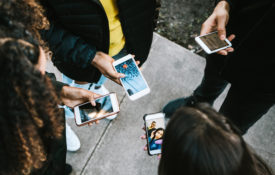-

New Research From Clinical Psychological Science
A sample of research on COVID-19 and mental health, early peer relations and psychopathology, cognitive behavioral therapy, machine learning to classify risk of suicide, intelligence and psychopathology, threats, anxiety, and aggression.
-

Little to No Increase in Association Between Adolescents’ Mental Health Problems and Digital Technology Engagement, Study Says
A new study in Clinical Psychological Science suggests that there has been little to no increase in the association between adolescents’ technology engagement and mental health problems.
-

New Research in Psychological Science
A sample of research on feelings of culpability, outside assistance and overconfidence, language development, spatial and visual perception, childhood tv exposure and attention problems, responses to the smell of fear, and physical strength and anxiety.
-

New Content from Advances in Methods and Practices in Psychological Science
A sample of articles on ego-centered social networks, bilingual infants and infant-directed speech, Type I error, estimating effect sizes, and linear mixed-effects in R.
-

From Activism to Radicalization: The Tipping Point of Unfairness
What can psychological science tell us about the causes and mental processes that push people from activism to radicalization? To shine some light on this topic, we hear from Kees van den Bos at the University of Utrecht, who is an expert on the study of radicalization.
-
Losing Our Other Significant Others: Without Social Interaction, Many are Placing Unrealistic Expectations on Live-in Partners
... After a year locked down, many Canadians find their community ties weakened. The characters who used to populate everyday life – work colleagues, gym buddies, craft groups, pub friends, local business owners – have dimmed from view. Together, they formed a community of “other significant others”– OSOs for short – the people we turn to for a multitude of social and emotional needs. Social psychology professor Eli Finkel coined the term to describe people who help us outsource, so we don’t overwhelm our romantic partners.

